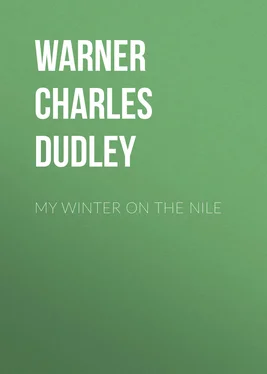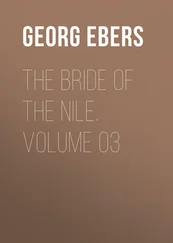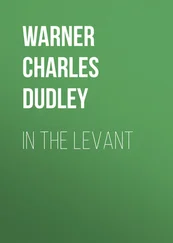Charles Warner - My Winter on the Nile
Здесь есть возможность читать онлайн «Charles Warner - My Winter on the Nile» — ознакомительный отрывок электронной книги совершенно бесплатно, а после прочтения отрывка купить полную версию. В некоторых случаях можно слушать аудио, скачать через торрент в формате fb2 и присутствует краткое содержание. Жанр: Путешествия и география, История, foreign_edu, foreign_antique, foreign_prose, на английском языке. Описание произведения, (предисловие) а так же отзывы посетителей доступны на портале библиотеки ЛибКат.
- Название:My Winter on the Nile
- Автор:
- Жанр:
- Год:неизвестен
- ISBN:нет данных
- Рейтинг книги:5 / 5. Голосов: 1
-
Избранное:Добавить в избранное
- Отзывы:
-
Ваша оценка:
- 100
- 1
- 2
- 3
- 4
- 5
My Winter on the Nile: краткое содержание, описание и аннотация
Предлагаем к чтению аннотацию, описание, краткое содержание или предисловие (зависит от того, что написал сам автор книги «My Winter on the Nile»). Если вы не нашли необходимую информацию о книге — напишите в комментариях, мы постараемся отыскать её.
My Winter on the Nile — читать онлайн ознакомительный отрывок
Ниже представлен текст книги, разбитый по страницам. Система сохранения места последней прочитанной страницы, позволяет с удобством читать онлайн бесплатно книгу «My Winter on the Nile», без необходимости каждый раз заново искать на чём Вы остановились. Поставьте закладку, и сможете в любой момент перейти на страницу, на которой закончили чтение.
Интервал:
Закладка:
CHAPTER VII.—MOSLEM WORSHIP.—THE CALL TO PRAYER
I SHOULD like to go once to an interesting city where there are no sights. That city could be enjoyed; and conscience—which never leaves any human being in peace until it has nagged him into a perfect condition morally, and keeps punching him about frivolous little details of duty, especially at the waking morning hour—would not come to insert her thumb among the rosy fingers of the dawn.
Perhaps I do not make myself clear about conscience. Conscience is a kind of gastric juice that gnaws upon the very coatings of a person’s moral nature, if it has no indigestible sin to feed on. Of course I know that neither conscience nor gastric juice has a thumb. And, to get out of these figures, all I wish to say is, that in Cairo, when the traveler is aware of the glow of the morning stealing into his room, as if the day were really opened gently (not ripped and torn open as it is in our own cold north) by a rosy-fingered maiden, and an atmosphere of sweet leisure prevails, then Conscience suggests remorselessly: “To-day you must go to the Pyramids,” or, “You must take your pleasure in a drive in the Shoobra road,” or “You must explore dirty Old Cairo and its Coptic churches,” or “You must visit the mosques, and see the Howling Derweeshes.”
But for this Conscience, I think nothing would be so sweet as the coming of an eastern morning. I fancy that the cool wind stirring in the palms is from the pure desert. It may be that these birds, so melodiously singing in the garden, are the small green birds who eat the fruits and drink the waters of Paradise, and in whose crops the souls of martyrs abide until Judgment. As I lie quite still, I hear the call of a muezzin from a minaret not far off, the voice now full and clear and now faint, as he walks around the tower to send his entreaty over the dark roofs of the city. I am not disturbed by this early call to the unconverted, for this is not my religion. With the clamor of morning church bells in Italy it is different; for to one born in New England, Conscience is in the bells.
Sometimes at midnight I am dimly conscious of the first call to prayer, which begins solemnly:
“Prayer is better than sleep.”
But the night calls are not obligatory, and I do not fully wake. The calls during the night are long chants, that of the daytime is much shorter. Mr. Lane renders it thus:
“God is most Great” (four times repeated). “I testify that there is no deity but God” (twice). “I testify that Mohammed is God’s Apostle” (twice). “Come to prayer” (twice). “Come to security” (twice). “God is most Great” (twice). “There is no deity but God.”
The muezzin whom I hear when the first faint light appears in the east, has a most sonorous and sweet tenor voice, and his chant is exceedingly melodious. In the perfect hush of that hour his voice fills all the air, and might well be mistaken for a sweet entreaty out of heaven. This call is a long one, and is in fact a confession and proclamation as well as a call to prayer. It begins as follows:
“[I extol] the perfection of God, the Existing forever and ever” (three times): “the perfection of God, the Desired, the Existing, the Single, the Supreme: the perfection of God, the One, the Sole: the perfection of Him who taketh to Himself, in his great dominion, neither female companion nor male partner, nor any like unto Him, nor any that is disobedient, nor any deputy, nor any equal, nor any offspring. His perfection [be extolled]: and exalted be His name. He is a Deity who knew what hath been before it was, and called into existence what hath been; and He is now existing, as He was [at the first]. His perfection [be extolled]: and exalted be His name.”
And it ends: “O God, bless and save and still beatify the beatified Prophet, our lord Mohammed. And may God, whose name be blessed and exalted, be well pleased with thee, O our lord El-Hassan, and with thee, O our lord El-Hoseyn, and with thee, O Aboo-Farrâg, O Sheykh of the Arabs, and with all the favorites [’.he welees’. of God. Amen.”
The mosques of Cairo are more numerous than the churches in Rome; there are about four hundred, many of them in ruins, but nearly all in daily use. The old ones are the more interesting architecturally, but all have a certain attraction. They are always open, they are cool quiet retreats out of the glare of the sun and the noise of the street; they are democratic and as hospitable to the beggar in rags as to the pasha in silk; they offer water for the dusty feet of the pilgrim and a clean mat on which to kneel; and in their hushed walls, with no images to distract the mind and no ritual to rely on, the devout worshipper may feel the presence of the Unseen. At all hours you will see men praying there or reading the Koran, unconscious of any observers. Women I have seen in there occasionally, but rarely, at prayer; still it is not uncommon to see a group of poor women resting in a quiet corner, perhaps sewing or talking in low voices. The outward steps and open courts are refuges for the poor, the friendless, the lazy, and the tired. Especially the old and decaying mosques, do the poor frequent. There about the fountains, the children play, and under the stately colonnades the men sleep and the women knit and sew. These houses of God are for the weary as well as for the pious or the repentant.
The mosques are all much alike. We enter by a few or by a flight of steps from the street into a large paved court, open to the sky, and surrounded by colonnades. There is a fountain in the center, a round or octagonal structure of carved stone, usually with a fanciful wooden roof; from faucets in the exterior, water runs into a surrounding stone basin about which the worshippers crouch to perform the ablutions before prayer. At one side of the court is the entrance to the mosque, covered by a curtain. Pushing this aside you are in a spacious room lighted from above, perhaps with a dome, the roof supported by columns rising to elegant arches. You will notice also the peculiar Arabic bracketing-work, called by architects “pendentive,” fitting the angles and the transitions from the corners below to the dome. In decaying mosques, where the plaster has fallen, revealing the round stick frame-work of this bracketing, the perishable character of Saracenic ornament is apparent.
The walls are plain, with the exception of gilded texts from the Koran. Above, on strings extending across the room are little lamps, and very often hundreds of ostrich eggs are suspended. These eggs are almost always seen in Coptic and often in Greek churches. What they signify I do not know, unless the ostrich, which can digest old iron, is a symbol of the credulity that can swallow any tradition. Perhaps her eggs represent the great “cosmic egg” which modern philosophers are trying to teach (if we may be allowed the expression) their grandmothers to suck.
The stone pavement is covered with matting and perhaps with costly rugs from Persia, Smyrna, and Tunis. The end towards Mecca is raised a foot or so; in it is the prayer niche, towards which all worshippers turn, and near that is the high pulpit with its narrow steps in front; a pulpit of marble carved, or of wood cut in bewildering arabesque, and inlaid with pearl.
The oldest mosque in Cairo is Ahmed ebn e’ Tooloon, built in 879 A.D., and on the spot where, according to a tradition (of how high authority I do not know), Abraham was prevented from offering up his son by the appearance of a ram. The modern name of this hill is, indeed, Kalat-el-Kebsh, the Citadel of the Ram. I suppose the tradition is as well based as is the belief of Moslems that it was Ishmael and not Isaac whose life was spared. The center of this mosque is an open court, surrounded by rows of fine columns, five deep on the East side; and what gives it great interest is the fact that the columns all support pointed arches , and exceedingly graceful ones, with a slight curve of the horse-shoe at the base. These arches were constructed about three centuries before the introduction of the pointed arch into Europe; their adoption in Europe was probably one of the results of the Crusades.
Читать дальшеИнтервал:
Закладка:
Похожие книги на «My Winter on the Nile»
Представляем Вашему вниманию похожие книги на «My Winter on the Nile» списком для выбора. Мы отобрали схожую по названию и смыслу литературу в надежде предоставить читателям больше вариантов отыскать новые, интересные, ещё непрочитанные произведения.
Обсуждение, отзывы о книге «My Winter on the Nile» и просто собственные мнения читателей. Оставьте ваши комментарии, напишите, что Вы думаете о произведении, его смысле или главных героях. Укажите что конкретно понравилось, а что нет, и почему Вы так считаете.












